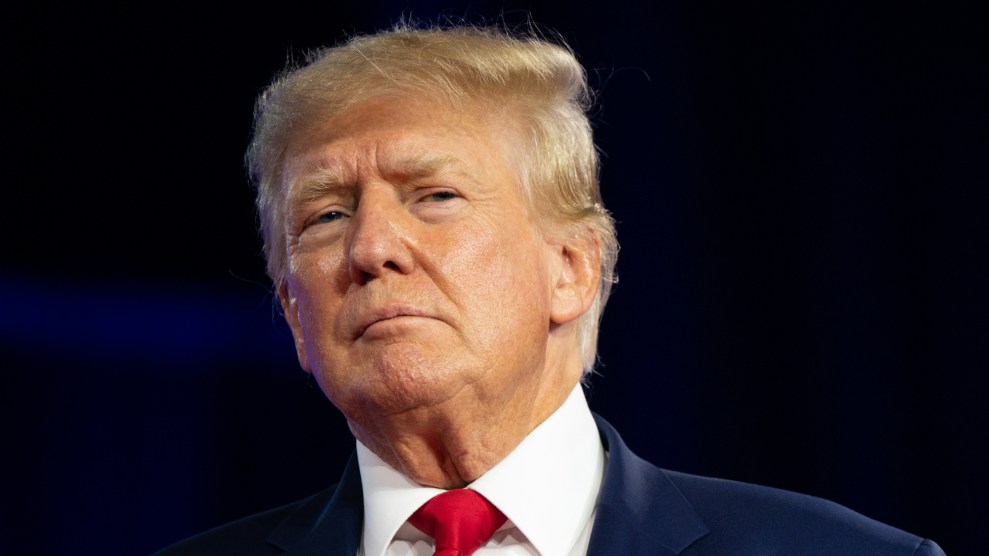
Attorney General Merrick Garland speaks at the Department of Justice on August 4, 2022.Manuel Balce Ceneta/AP
Merrick Garland has forced his own hand.
With the surprise FBI raid on Donald Trump’s much-cherished Mar-a-Lago residence and club, the attorney general has set up a serious test for himself, the Justice Department, and the FBI: to prove this unprecedented act was fully justified. To do that, the feds will eventually have to produce an indictment. Consequently, Garland and FBI Director Chris Wray, who each presumably okayed the FBI search, have created a powerful incentive for a thorough investigation that will yield public evidence of Trump-related wrongdoing.
The insta-commentary regarding the FBI visit, which was reportedly in connection with Trump’s improper retention of official records and classified documents after he left the White House, made the obvious point: The Justice Department was highly unlikely to authorize such an action without a clear indication that a crime had occurred. Of course, to obtain a search warrant, FBI agents must demonstrate probable cause to a judge. In this case, it is reasonable to assume that Garland’s DOJ was especially fastidious and believed the case at hand was a strong one, with the possible crime a serious offense. Ralph Waldo Emerson’s famous quote comes to mind: “When you strike at a king, you must kill him.” Or the version uttered by Omar, the legendary stick-up man on The Wire: “Come at the king, you best not miss.” You don’t raid the home of a former president, unless you have damn good reason to do so.
Not surprisingly, the Trump cult (that is, the Republican Party and almost all of the conservative movement) immediately reacted to news of the raid by claiming it was a brazen political assault that continued the Deep State’s persecution of its Dear Leader and by vowing retribution (as House GOP leader Kevin McCarthy did by targeting Garland) or threatening civil war. The Trumpers will not accept the legitimacy of any investigation of Trump, and this crowd that cheered on Trump when he shouted “lock her up” and when called on his Justice Department to persecute his political foes will not for a moment concede there might be cause for the FBI’s action. Yet in the middle of their hypocritical and hyper-charged outrage, there is an important point. All Americans should be mindful of any administration possibly using the power of the state to thwart or tar its critics and opponents. Consequently, Garland faces a serious challenge of his own making.
Under Justice Department rules, federal prosecutors are not allowed to reveal the details of investigations outside of indictments and court filings. This is to protect the subjects of probes. If an investigation ends up with no prosecution, the person or entity investigated ought not be blemished. This rule has occasionally been broken, most famously when FBI Director Jim Comey disclosed that the bureau was investigating Hillary Clinton for her use of a private server for her emails when she was secretary of state. And I’ve argued that Garland should have set this rule aside and told the public what his department was doing regarding possible investigations of Trump and his crew’s efforts to overturn the 2020 election. But it’s generally a sound rule, and so far the Justice Department and the FBI appear to be adhering to it by not commenting on the Mar-a-Lago raid.
We probably won’t see a press conference from Garland, Wray, or anyone else that details the reasons for the raid—though in this highly unusual instance, too, one could contend that an exception is warranted. But let’s assume Garland and the others remain tight-lipped. That means the only way the Justice Department will be able to justify the search will be to issue an indictment. An indictment would reveal the crime being investigated and why the bureau concluded an uninvited trip to Trump’s resort was necessary. Whatever details are contained in such an indictment would likely not be sufficient to convince the Trump fanatics, but they could convince reasonable-minded Americans that the Justice Department and the FBI acted appropriately and legally.
We have all heard countless times that Garland is an institutionalist who cares deeply about depoliticizing the Justice Department and its reputation. Certainly, Garland, widely criticized by progressives for not vigorously investigating Trump, cares about his own rep, too. He and the department are now highly incentivized to justify the FBI raid to preserve the image of the department and the bureau—as well as his own. The stakes are high, and Garland has crossed a line. For him and the department to prove this was not an obscene abuse of power, the investigation must reach the point where indictments are released and information is presented to the public. If the probe fails to hit that stage, this raid will indeed create suspicion (for those not in the Trump cult) and tarnish the department. To prevent a massive blow to the DOJ, the department has to pursue this matter vigorously and eventually unveil a strong case. Garland will have to put the department’s cards on the table. There can be no bluffing here.
As of now, it is easy to speculate about the investigation. The boxes of documents Trump improperly took from the White House—which contained highly classified materials—had been returned. So a good guess is that this probe is focused on how that material was handled. Were all the records sent back? Were any documents destroyed, copied, or shared with another party? Does the possible crime involve someone other than Trump? (We do know that foreign intelligence services, including the Chinese intelligence service, have targeted Mar-a-Lago.)
The mystery might remain for a while, absent an official statement or leaks from the Justice Department and the FBI. Meanwhile, the political battle detonated by the raid will not fade. This move has increased the already excessive and unfounded paranoia on the Trump right and has placed the Justice Department in a tight spot. The only way out for Garland and the department is to show it had no choice but to send its agents to search the home of a former president and blow his safe. For that to happen, someone will likely have to be indicted.








